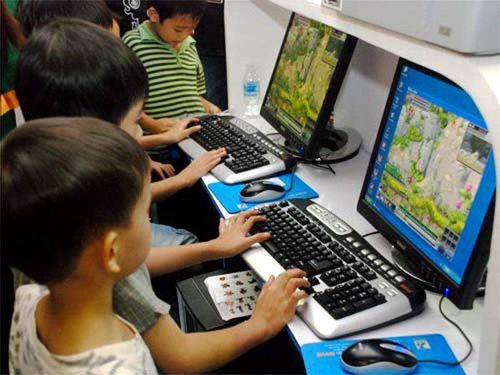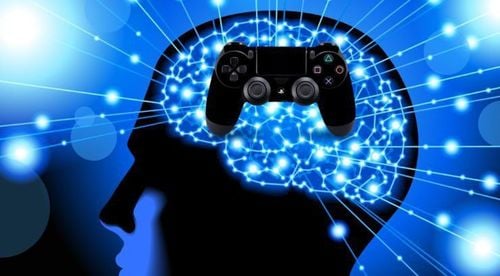This is an automatically translated article.
Video game addiction is a very real problem for many people. This disorder can have significant consequences, but the signs are sometimes difficult to recognize.1. What makes video games addictive?
Many different causes of game addiction. However, one of the main reasons games can become so addictive is that they are designed in a way that appeals to players.
Video game designers, like anyone else trying to make a profit, are always looking for ways to get more people to play their games. They work towards this goal by creating games that are challenging enough to keep you playing but not so hard to put players off.
In other words, gamers often feel that every victory is never enough. In this respect, video game addiction is very similar to a more widely recognized disorder: gambling addiction.
2. What are the signs of video game addiction?
Like any other addiction, video game addiction has warning signs. It is important to know how to recognize these signs if the player or someone of interest is a gamer. Symptoms can be both mental and physical.
2.1. Mental symptoms of video game addiction Some emotional signs or symptoms of video game addiction include:
Feelings of restlessness and/or irritability when unable to play Preoccupation with game activities previous or predicted next turn Lie to friends or family members about playtime Isolate yourself from others to spend more time playing the game.
2.2. Physical Symptoms of Video Game Addiction Some of the physical signs or symptoms of video game addiction include:
Fatigue Migraines due to intense focus or eye strain Carpal tunnel syndrome excessive use of computer controllers or mice Poor personal hygiene.

Người nghiện game thường xuyên có triệu chứng mệt mỏi do chơi nhiều
3. Short-term and long-term effects of video game addiction
Like any other mental disorder, video game addiction can have serious consequences. The symptoms listed above have short-term effects, however, they can lead to more serious long-term consequences if not addressed promptly. For example, a person addicted to video games will often avoid sleeping or eating meals on time in order to continue playing the game. While the short-term effects of this can include hunger and fatigue, it can eventually lead to sleep disturbances or diet-related health problems.
Similarly, people who isolate themselves from others to play video games may miss out on healthy activities with family, loved ones, and friends. However, if the player continues such actions for a long time, it may feel like he has no friends.
Other long-term effects of video game addiction to consider are the financial, academic and occupational consequences involved. Games and video game equipment can be very expensive, especially when it comes to recurring expenses such as the high-speed Internet connection required for online multiplayer games. These games can also be very time consuming, leaving addicted gamers without much time to focus on their studies or work.
4. Brain changes from excessive video game play
Levels of dopamine (a hormone that increases excitement in the brain) double when people play video games, which means addictive games are also chemically addictive. There are neural pathways in the brain that maintain dependence on substances - potentially reinforcing obsessive-compulsive disorders.
Therefore, the simplest formula for making an addictive game is to make it challenging, interesting and rewarding. Any game can produce a pleasant feeling for a short period of time, but games are precisely addictive, although the degree of addiction is different for each person.
5. Addictive elements of video games

Có rất nhiều trò chơi điện tử không mất phí
5.1. Many free video games Many games use a free to play model to play online. Most players will be guided through a few simple tasks, all of which are rewarded with colorful graphics and positive messages.
Once the player is interested, also when the level becomes more and more difficult, then the user will be asked to pay a few dollars for an additional opportunity to try higher levels or remove barriers from the game. game mechanics.
5.2. Wait to Play Many free games earn money by forcing players to wait to complete actions, unless they pay to skip this delay.
Other games allow players a certain number of tries by giving them a certain number of lives. Once those lives have been spent, they will be recharged with more lives over time, at a rate of one life per hour.
It may seem counter-intuitive that a game will keep the player waiting to continue playing, but this waiting serves two purposes. It requires the player to keep opening the app, which becomes a habit. More importantly, it's an effective way to monetize players.
5.3. Always update to level up the player The reason is that in the game the player role-plays the character, has fun, interacts with friends and is almost impossible to win.
Even if the player can complete all the objectives, the founders will also release an expansion so that the game never ends. New quests keep the game interesting, but the game's founder also refuses to create games that give players a sense of total victory.
5.4. The allure of progress bars in games Many modern games come with a visual representation of how close a person is to completing an objective, known as the “progress bar”. This is usually a horizontal rectangle that slowly fills as it gets closer to the target.
When one is close to leveling a skill, it's easy to justify playing a few extra minutes to get to the next level before quitting.
As soon as it levels up, the player's ability to use magic is also ready to level up, so they decide to play until it rises to a higher level. As soon as the progress bar is filled, the ability to block attacks is also better. The player continues to play. It has an endless cycle.
5.5. To Play With Friends The ability to share gaming experiences with others is a great way to create and maintain friendships, especially for shy people. However, playing games with other people comes with certain risks.
When playing games together, often players will spend time and energy supporting others. It becomes a problem when you are trying to do your homework or go to bed but your friends invite you in.
5.6 Feeling of escape from reality In the game, players can live freely according to their own taste and style, experience complete freedom, not bound by responsibilities, family, culture, even even legal or ethical standards.
However, once led by curiosity and mental stimulation, showing bravery, they are easily drawn to the negative side of the game leading to lust, climax or more extreme experience. .
5.7. The attractiveness of the game rewards also makes it attractive by linking the assigned task with an attractive reward. Rewards can be scores, skills or items, beautifully designed with effects.
Players often accept “missions” and unconsciously complete them with increasing difficulty. This requires gamers to focus and spend time playing more to be able to complete the assigned task.
More seriously, it creates the illusion for gamers that they will definitely be rewarded, making them "plow the game" in the unknown and blind. Psychologically, it is these hopes of virtual rewards that motivate them to keep playing.

Trò chơi điện tử đặt ra nhiều quy tắc cùng như phần thưởng để tạo nên tính hấp dẫn gây nghiện
5.8 Satisfying skill upgrades Successful games, or in other words, addictive games equal to the difficulty level in the levels played. The game becomes more complex through the ranks making the player want to complete the challenges.
Psychological clinic at Vinmec Times City International Hospital went into operation in April 2019 with the function of examining, consulting and outpatient treatment of psychological and mental health problems, especially is for psychological problems in children and adolescents by implementing psychological tests, intensive psychotherapy.
The clinic has modern equipment and a team of doctors who are lecturers from Hanoi Medical University, capable of performing psychological tests and intensive psychotherapy.
MSc. Doctor Nguyen Van Phi - Psychology Specialist, Vinmec Times City International Hospital: with 07 years of experience working as a lecturer at Hanoi Medical University and a member of the Vietnam Psychiatric Association Male. MSc. Doctor Pham Thanh Luan - Psychologist, Vinmec Times City International Hospital: with 05 years of experience in researching, examining and treating diseases of the Psychology specialty, trained at prestigious universities trust, practice in-depth expertise in the French Republic. MSc. Doctor Nguyen Trong Hien - Psychologist, Vinmec Times City International Hospital: with 06 years as a lecturer in Psychology - Hanoi Medical University and the Central Geriatric Hospital with the same experience Researching, examining and treating diseases under the specialty of Psychology such as: Emotional disorders, Stress related disorders and body dysmorphic disorders, developmental disorders in children, adolescents & childbearing period. ...
Please dial HOTLINE for more information or register for an appointment HERE. Download MyVinmec app to make appointments faster and to manage your bookings easily.
Article reference source: mentalguides.com, brainscape.com, psychologytoday.com












